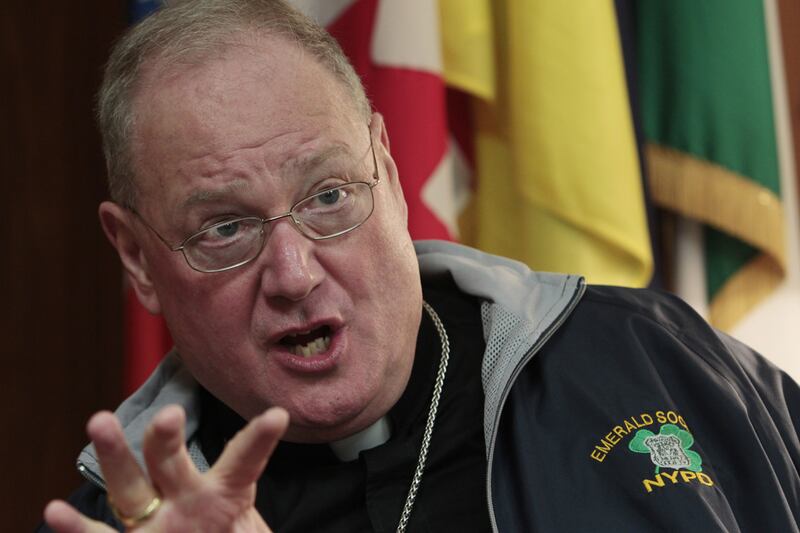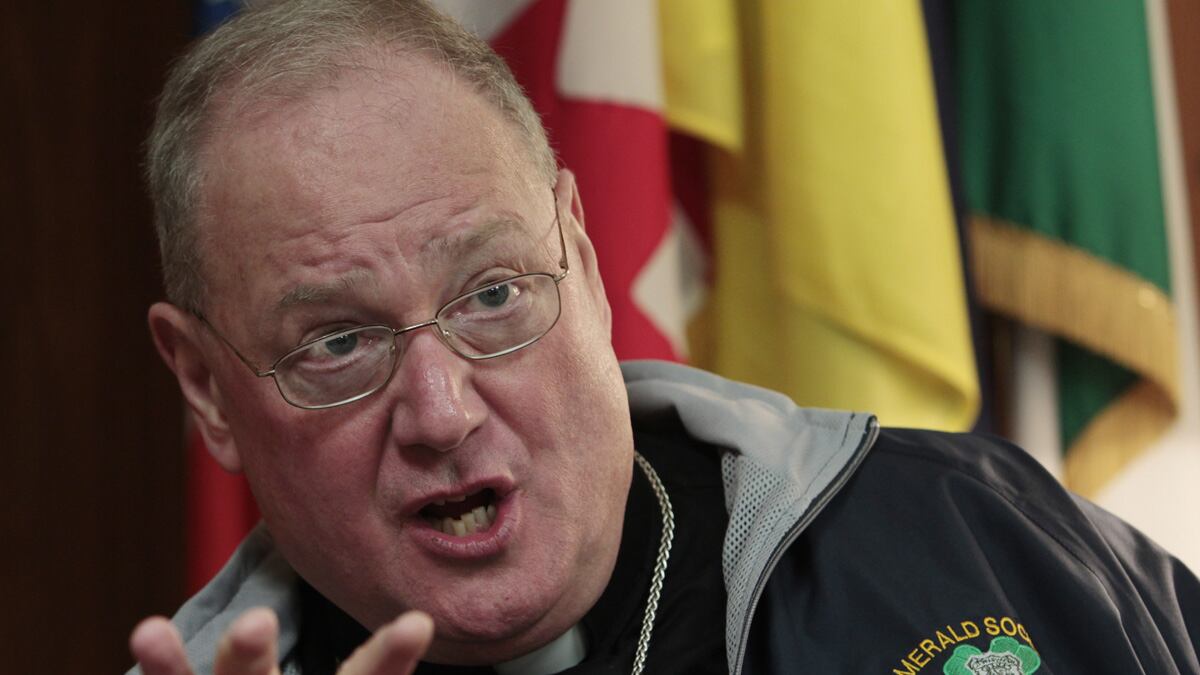Timothy Dolan, archbishop of New York and newly made a cardinal, says he never wanted to be a fighter. Then he got a chance to throw a punch at the president.
Speaking at Fordham University in late January, Dolan came out forcefully against the Obama administration’s then just-announced health-care policy that would require employers, including religiously affiliated universities and hospitals, to cover free contraceptives for women. “You bet we got a disagreement,” Dolan said.
But while Dolan has lately emerged as a vehement foe of both the initial and revised versions of the White House’s plan, his voice was rarely heard before this year, even as laws in New York and Wisconsin compelled Catholic institutions under his spiritual direction to provide employees with health-insurance plans that cover prescription birth-control medication.
ADVERTISEMENT
Dolan, since 2009 the spiritual leader of New York’s 2.5 million Catholics spread over 350 parishes, had said nothing publicly about the state’s mandatory coverage for contraceptives since 2002, when Republican Gov. George Pataki signed the Women’s Health and Wellness Act over the objections of Cardinal Edward M. Egan, then head of the archdiocese.
“We bishops aren’t fighters,” Dolan said in an interview on Feb. 9, a line he’s used regularly since taking up the issue in response to the administration’s plan. “It’s not like we’re welcoming this, this isn’t a fight of our choosing. It was sort of imposed on us.”
But Dolan appears to have avoided the fight for years, even at the prominent Jesuit university where he declared his “disagreement” with Obama. According to Jeanne Flavin, a professor of sociology at Fordham and author of the book Our Bodies, Our Crimes: The Policing of Women’s Reproduction in America, the university has been providing birth control to female employees under its health-care plan since she started working at the school in 1995, well before the state mandate was enacted.

“I do recall a period of time where a policy existed but was not well publicized or widely known among new faculty,” she said of when she first arrived at Fordham. Now, however, the university plan affords Flavin—who says she’s never felt any interference from the school or archdiocese on the issue of birth-control coverage—a prescription-drug benefit to buy contraceptives at a pharmacy or by mail. “Aside from those very early years, I have been able to obtain comprehensive health-care services from my primary-care physician and ob/gyn without incident,” she told the Beast.
Spokespeople for Fordham did not return requests for comment.
Dolan also did not appear to raise the issue in regard to St. Francis College, a Roman Catholic liberal-arts college in Brooklyn where female faculty are eligible for contraceptive coverage under the school’s Oxford/United Health plan. According to a professor at the college, the same health plan also covers abortion: “One procedure for elective termination of pregnancy per calendar year.” The professor requested The Daily Beast withhold her name out of concern that St. Francis could change its “don’t ask, don’t tell” approach to contraceptive coverage if the press began telling about it.
“St. Francis has never dictated to any faculty member, as far as I know, any rules about contraception or contraceptive coverage,” the professor said. “We are free to choose any doctor under our plan, and if we are prescribed birth control, it is covered by our plan and we are only responsible for the co-pay, just like any other prescribed medication that is covered.”
Richard Relkin, a spokesman for St. Francis College, was told of the details of the employee plan as they appear in this story, but declined to confirm them or otherwise comment.
Joseph Zwilling, director of communications for the archdiocese, did not respond by press time to requests for comment on what seems to be Dolan’s newly assertive stance on the issue of mandated coverage for birth control.
Even if Obama had been a regular reader of Dolan’s communications to his flock, the president couldn’t have anticipated this battle. In the 70 columns Dolan has penned for Catholic New York, an archdiocesan newspaper, he has not once discussed New York’s mandate or the insurance plans at Catholic institutions that provide birth control under their plans, and only once discussed contraception. That came in his Oct. 20, 2011, column, “Threats to Religious Freedom Harm More Than Religion,” about the government’s decision to deny funds to the Migration and Refugee Services, an arm of the Conference of Catholic Bishops.
“While no convincing reason has yet to be given, the chilling warning seems clear,” Dolan wrote in a column that didn’t mention Obama or any other politician by name. “If you don’t offer ‘reproductive services’—abortion, contraception, sterilization—you will no longer get grants from Health and Human Services.”
While Dolan has discussed health plans that cover birth control as a threat to religious freedom on his blog, The Gospel in the Digital Age, several times since the mandate was first announced in late January, he hasn’t mentioned there that such plans are already offered at numerous Catholic institutions in New York. Prior to this year, the archbishop rarely discussed contraception or birth control, and when he did it was usually in the context of what he saw as moral decline in America.
Dolan kept a similarly low profile on the issue of mandated coverage when he was Archbishop of Milwaukee from 2002 to 2009. In June of 2009, Wisconsin became one of the now 28 states that require health insurers to cover birth control without a co-pay. Dolan, who had been reassigned to New York that February, wasn’t very involved with the mandate either before or after leaving the state, said John Huebscher, executive director of the Wisconsin Catholic Conference—who added that the measure was a little-discussed eleventh-hour addition to the state’s budget.
Lisa Subeck, executive director of NARAL Pro-Choice Wisconsin, also said Dolan didn’t figure much in discussion of coverage for birth control in Wisconsin.
“We certainly didn’t see him speaking out in a big, high, very public way,” said Subeck, whose group lobbied for the measure. She pointed to Bishop Robert C. Morlino, who has served as head of the Diocese of Madison since 2003, as “the most vocal of the bishops” on the issue.
Under the Wisconsin mandate, she said there is no exemption for religious reasons of any kind, not even for church employees. The only exemption provided is for entities that choose to self-insure, an option some Wisconsin diocese and religiously affiliated hospitals and schools decided to take to avoid paying even indirectly for contraceptives.
“I don’t think there was a lot of outrage or pushback,” Subeck said. “Certainly there were the usual lobbying groups.”
Sean Dilweg, as Wisconsin’s insurance commissioner, was responsible for making sure that the health-insurance companies implemented the new regulations in 2009. The main opponents to the plan were large, Milwaukee-area hospitals affiliated with the church and those ended up self-insuring, said Dilweg, who added that he heard little from Dolan before the mandate became law, and nothing afterward from Dolan or the Conference of Catholic Bishops he headed.
But even before the 2009 measure mandating the coverage, the health-insurance plan of a major Catholic university was covering birth control for its employees under Dolan’s watch. At Marquette, a Catholic university in Milwaukee, the university’s plan has covered contraceptives, but not emergency contraceptives, since before 1990, according to spokesman Brian Dorrington.
“These provisions recognize that a significant portion of the University’s employees are not Catholic and that contraceptives are at times prescribed by physicians for purposes other than birth control,” Dorrington said. “It is also important to point out that the availability of a benefit does not require that an employee make use of it, as the choice to use a contraceptive is a matter of conscience.”
After Dolan left for New York but before his successor in Milwaukee was installed, four Wisconsin bishops and the Milwaukee archdiocesan administrator did speak publicly about the state rule, in a statement on the letterhead of the Wisconsin Catholic Conference.
“This mandate will compel Catholic dioceses, parishes, and other agencies that buy health insurance to pay for a medical service that Catholic teaching hold to be gravely immoral,” the bishops wrote. “As Catholic teachers and pastors, we strongly object to this blatant insensitivity to our moral values and legal rights.”
As the Wisconsin mandate went into full effect in 2010, Huebscher said, he and others in Milwaukee looked to the American church’s national leadership for assistance—a group that included Dolan, who in November of 2010 was elected president of the United States Conference of Catholic Bishops.
“You know, the [Wisconsin] bishops made their statement and we proceeded in trying to get this addressed,” Huebscher said. “Everybody was watching Washington” as the local leaders hoped to make a national issue out of the mandate, he said. But the conference, led by Dolan, never publicly addressed the issue. So after staying clear of the mandated contraception issue in Wisconsin and then New York, Dolan this year helped turn it into a packet of political nitroglycerin that he dropped on the White House’s stoop in the midst of the presidential election.
“I don’t recall him being outspoken on the issue,” Dilweg said. “We did not have any contact on the issue.”





